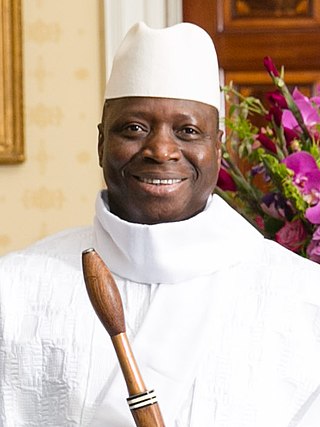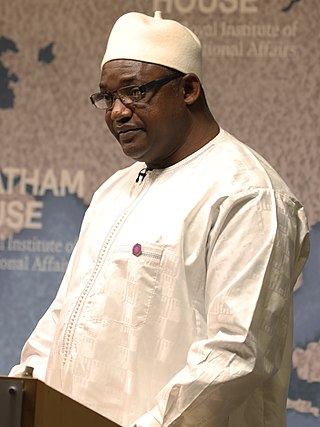Related Research Articles

The Gambia, officially the Republic of The Gambia, is a country in West Africa. Geographically, The Gambia is the smallest country in continental Africa; it is surrounded by Senegal, except for its western coast on the Atlantic Ocean. It is situated on both sides of the lower reaches of the Gambia River, which flows through the centre of the country and empties into the Atlantic Ocean. The national namesake river demarcates the elongated shape of the country, which has an area of 11,300 square kilometres (4,400 sq mi) and a population of 2,468,569 people in 2024. The capital city is Banjul, which has the most extensive metropolitan area in the country; the second- and third-largest cities are Serekunda and Brikama.

Politics of The Gambia takes place within the framework of a presidential republic, whereby the President of The Gambia is both head of state and head of government, and of a multi-party system. Executive power is exercised by the government. Legislative power is vested in both the government and parliaments.

Yahya Abdul-Aziz Jemus Junkung Jammeh is a Gambian politician and former military officer, who served as President of the Gambia from 1996 to 2017, as well as Chairman of the Armed Forces Provisional Ruling Council from 1994 to 1996.

The United Democratic Party is a political party in the Gambia, founded in 1996 by 3 political parties and choose the human rights lawyer, freedom fighter, ANM Ousainou Darboe to be the party leader and Secretary General. As a candidate in the presidential election of 18 October 2001, he came second with 32.6% of the popular vote; he took second place again in the 22 September 2006 presidential election with 26.7% of the vote. The 17 January 2002 parliamentary election was boycotted by the party. In the 25 January 2007 parliamentary election, the party won four out of 48 seats.

Ousainou Darboe is a Gambian politician and leader of the main opposition United Democratic Party (UDP). He previously served as Vice-President of the Gambia and Minister of Women's Affairs from June 2018 to March 2019, under President Adama Barrow. He also served as President Barrow's Minister of Foreign Affairs from February 2017 to June 2018.

Lesbian, gay, bisexual, and transgender (LGBT) people in the Gambia face significant challenges not experienced by non-LGBT residents. Same-sex sexual activity is illegal for both men and women in the Gambia. Criminalisation commenced under the colonial rule of the British. The 1933 Criminal Code provides penalties of prison terms of up to fourteen years. In 2014, the country amended its code to impose even harsher penalties of life imprisonment for "aggravated" cases. The gender expression of transgender individuals is also legally restricted in the country. While the United States Department of State reports that the laws against homosexual activity are not "actively enforced", arrests have occurred; the NGO Human Rights Watch, reports regular organised actions by law enforcement against persons suspected of homosexuality and gender non-conformity.

The Cabinet of The Gambia is responsible for advising the President of The Gambia and for carrying out other functions as prescribed by law. It is composed of the President, the Vice-President, To date, all Prime Ministers and Presidents have represented and the Secretaries of State. It is responsible for regulating the procedure of its own meetings and is held accountable for its actions by the National Assembly, according to Sections 74 and 75 of the Constitution of The Gambia.

Presidential elections were held in The Gambia on 1 December 2016. In a surprise result, opposition candidate Adama Barrow defeated long-term incumbent Yahya Jammeh. The election marked the first change of presidency in The Gambia since a military coup in 1994, and the first transfer of power by popular election since independence from the United Kingdom in 1965.

Isatou Touray is a Gambian politician, activist, and social reformer. A noted campaigner against female genital mutilation (FGM), she became the first female Gambian presidential candidate in 2016, before dropping out to endorse Adama Barrow and Coalition 2016. She then served in Barrow's cabinet, as trade minister, and then as health minister. On 15 March 2019, Touray became Vice-President of The Gambia, replacing her predecessor, Ousainou Darboe in a major cabinet reshuffle.

Adama Barrow is a Gambian politician and real estate developer who has served as President of the Gambia since 2017.
The State Intelligence Services (SIS), formerly the National Intelligence Agency (NIA), is the intelligence agency of the Gambia. It was founded following the 1994 military coup d'état by the Armed Forces Provisional Ruling Council (APRFC), which was led by Yahya Jammeh. Its current head is Ousman Sowe.

A constitutional crisis occurred in Gambia following presidential elections in December 2016, in which challenger Adama Barrow achieved an upset victory over longtime incumbent Yahya Jammeh. It eventually concluded after a military intervention by the Economic Community of West African States (ECOWAS) led to Jammeh’s departure from the country.

United Nations Security Council Resolution 2337 was a measure unanimously adopted by the United Nations Security Council (UNSC) on 19 January 2017. It expressed support for efforts by ECOWAS to peacefully resolve the 2016–2017 Gambian constitutional crisis, calling on President Yahya Jammeh to step down and allow a peaceful transition to the President-elect, Adama Barrow, as well as supporting the African Union and ECOWAS decisions in recognizing Adama Barrow as the new president. The measure was adopted by a vote of 15 supporting, none opposed, and none abstained.
The following lists events in the year 2017 in the Gambia.

Following his victory in the presidential election on 1 December 2016, the newly elected President Adama Barrow appointed a new cabinet to succeed the cabinet of Yahya Jammeh, his predecessor. Barrow was formally inaugurated on 19 January 2017 at the embassy of the Gambia in Dakar, Senegal, and was able to return the Gambia on 26 January. He made the bulk of appointments in February 2017, and conducted major reshuffles in June 2018, March 2019 and May 2022.
The Truth, Reconciliation and Reparations Commission (TRRC) is a truth commission in The Gambia to investigate the Yahya Jammeh era from 1994 to 2017. The process from the announcement of the commission to its launch lasted from 20 July 2017 to 15 October 2018. Its executive secretary is Baba Galleh Jallow, its lead counsel is Essa M. Faal, and the chairperson of the 11-strong commission is Lamin J. Sise.

Presidential elections were held in the Gambia on 4 December 2021. The result was a victory for incumbent President Adama Barrow of the National People's Party, who received 53% of the vote, defeating five other candidates.
Amie Bojang-Sissoho is a Gambian journalist, women's rights activist and politician. She emerged Gambian first woman government's Director of Press and Public Relation following her appointment by president Adama Barrow.
Capital punishment remains a legal penalty for multiple crimes in the Gambia. However, the country has taken recent steps towards abolishing the death penalty.
Fatoumatta Bah-Barrow, also spelled Fatoumata, is the first wife of Gambian President Adama Barrow and the First Lady of the Gambia since 2017.
References
- ↑ "Gambia". Human Rights Watch. Retrieved 2017-11-02.
- ↑ "The Gambia: President Adama Barrow pledges reforms". www.aljazeera.com. Retrieved 2017-11-02.
- ↑ "Gambia, The". freedomhouse.org. Archived from the original on 2018-01-22. Retrieved 2018-01-22.
- ↑ "The Gambia passes bill imposing life sentences for some homosexual acts". The Guardian. Associated Press. 2014-09-08. ISSN 0261-3077 . Retrieved 2017-11-02.